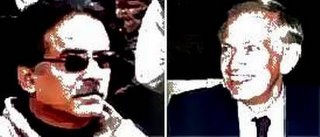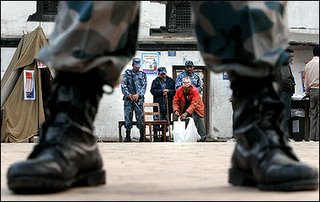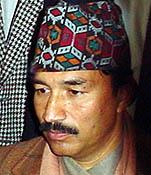 Never in the field of Nepal's conflict -- to paraphrase Winston Churchill -- was so much owed by so many to so few. Or, more accurately, to one man.
Never in the field of Nepal's conflict -- to paraphrase Winston Churchill -- was so much owed by so many to so few. Or, more accurately, to one man.U.S. Ambassador James F. Moriarty's February 15 speech warning mainstream political parties against aligning themselves with the Maoist rebels against King Gyanendra continues to rouse the nation. Although His Excellency reserved some of his harshest words to rubbish the royal regime's yearlong record in office, the prime beneficiary of his speech was the palace. The king retreated half a step in his Democracy Day message and a realignment of non-communist forces has once again become a viable project.
The Seven-Party Alliance (SPA), having spent much of the past year extolling the Washington-London-New Delhi axis' sustained pressure against the palace, was rather subdued in its response to Moriarty. It fell upon civil society to warn the alliance constituents not to lose their coherence in the face of this latest egregious display of American unilateralism.
In subsequent comments to a newspaper, Moriarty essentially reiterated his original contention: if armed Maoists and unarmed parties successfully implement the insurgents' vision of a violent revolution, the Maoists will ultimately seize power, and Nepal will suffer a disaster that will make its current problems pale in comparison.
One leader was especially attentive. The first thing Nepali Congress (Democratic) president Sher Bahadur Deuba did after walking out of prison was not rail against the king who tormented him but poke holes in the three-month-old 12-point pact between the SPA and the Maoists.
On a parallel track, Deuba and Girija Prasad Koirala are seriously working out unity arrangements between their two factions of Nepal's largest democratic party. Significantly, this time, Deuba is negotiating from a position of strength.
With Unified Marxist-Leninist general secretary Madhav Kumar Nepal under detention, the principal communist faction in the mainstream is in disarray. For one thing, no one is sure which subordinate speaks authoritatively for the general secretary. Moreover, a few other eloquent leaders have gone underground to evade arrest. No wonder the UML, which sought to take exclusive credit for the agreement with the Maoists, couldn't vote in favor of a proposal to incorporate the rebels in a broader front against the palace.
The Maoists, understandably, were miffed the most by Moriarty. Regaining the initiative from party supremo Prachanda, chief ideologue Dr. Baburam Bhattarai used a newspaper article to unleash a diatribe against Moriarty's pontification. (Dr. Bhattarai's apparent swipe at the Vatican, through the article headline, was perhaps unintentional.)
Indeed, the Maoists must be under tremendous pressure from their mentors in the erstwhile Revolutionary International Movement. For this group of international proletariats, much was at stake in Nepal's Maoist insurgency. The Nepalese comrades' sudden alliance with the SPA was bad enough. Their repudiation all but ideological links with newly resurgent Indian Maoists was unpardonable, especially after all the noise about creating a South Asian Compact Revolutionary Zone.
Even after Dr. Bhattarai's exegesis, we don't know how much the Maoists actually hold the United States responsible for the world's ills. Moriarty, for his part, could hardly have been impressed by Dr. Bhattarai's indictment when much of the world is accusing Uncle Sam of worse things.
As for the blistering criticism he triggered in the Indian media, Moriarty perhaps expected it. After all, he was in New Delhi when Nepal's mainstream leaders and the Maoists negotiated the accord with India's overt blessings.
All the same, Moriarty's remarks have had a beneficial effect. It has sensitized Nepalis into recognizing their primary responsibility in saving the nation. No amount of blood, toil, tears and sweat – pardon this Churchillian fixation -- can alter this reality.
 It looks like the volatility of Nepal's political fluidity is going to be determined by how the Prachanda-James F. Moriarty posturing plays out.
It looks like the volatility of Nepal's political fluidity is going to be determined by how the Prachanda-James F. Moriarty posturing plays out.


